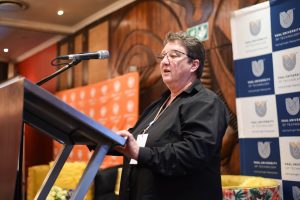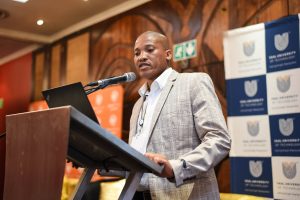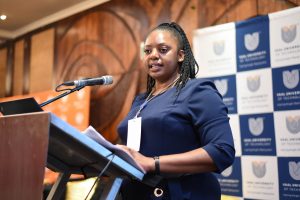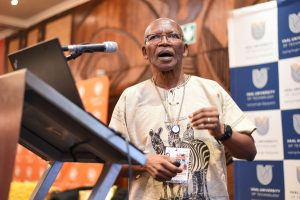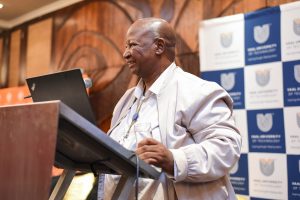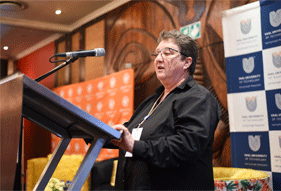
MEGA CONFERENCE REFLECTS ON EXPERIENCES PRE, DURING AND POST COVID-19 PANDEMIC IN THE HIGHER EDUCATION SECTOR
By: Nontobeko Moimane- 29 November 2022
The Covid-19 pandemic has changed the parameters of the higher education sector as institutions had to ensure academic progression, with no student left behind in their studies. This was a period where institutions had to learn about the differences in university selections pre and post COVID-19 pandemic, which might help them focus on related constraints in the post-pandemic era.
To address such parameters, on Wednesday, 23 November 2022, the Vaal University of Technology (VUT)’s Centre for Academic Development (CAD) recently held its annual mega Conference themed: “The well-being of academics and professional staff – voices and experiences during and post Covid-19”.
The Conference sought to address the challenges that the higher education sector faced in the past two years in South Africa and globally, with the Covid-19 pandemic resulting in emergency remote teaching and learning. The Conference gave both academic and professional staff a platform to share their research and experiences on the impact that “the new normal” had on their overall well-being.
Giving his welcoming address, Dr Muntuwenkosi Chili, the CAD Executive Director, mentioned that the teaching and learning environment must be enabled for both students and staff. It also requires ongoing attention to the structure and content of the curriculum and to the ways that scholarship and research impact this curriculum. “The Centre strive to provide quality education through capacity building of academics in technology-infused learning and teaching methodologies that are student-centred and enable epistemological access through a technology-infused and data-informed educational support leading to student success”, he added.
He further shared that the Conference is the space for Academic Developers, practitioners, academics and university leaders, educational experts etc., to reflect and advance the future of higher education by broaching meaningful conversations and a way forward on teaching and learning and how interventions can be focused to achieve student success while maintaining the quality and integrity of our assessments.
He added that “through this Conference, we want the VUT community and academics to be proud and to be the custodian of this gathering – one which must become a flagship event on our teaching and learning calendar and that of many institutions in the higher education sector. The CAD has only one path, and that is growth and excellence. We cannot afford to look back and be characterized otherwise. The future must pull and determine us”.
Professor Maggie Linington, the Deputy Vice-Chancellor: Teaching, Learning and Student Support Services, addressed the theme and mentioned that the pandemic came at a time when most organisations and institutions didn’t have change management, project management and contingency plans for such parameters. She added that with all challenges that came with the pandemic, “we have survived the extreme and have learnt the extreme from the pandemic.”
Prof Linington shared her thoughts on the pandemic and what must be learned from it. She stated that we learnt to multi-task and have devised solutions to continue with the teaching and learning programmes that led to blended learning. “Contact learning was disrupted by the pandemic and resulted in online blended learning, which affected student engagement. The reality is that students need to be engaged to further progress in their study programme”, alluded Prof Linington. She added that students’ success is everyone’s responsibility and must be shared responsibility. “We need to make sure our seed (students) grows”.
Several speakers presented on the topic and gave insightful information that can create more debates and solutions to the challenges faced pre, during and post Covid-19 to better the well-being of academics, students, and professional staff.

